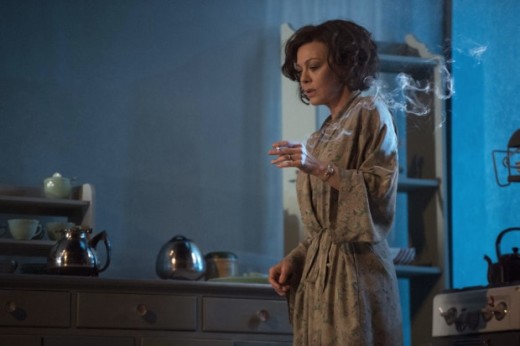You have no items in your cart. Want to get some nice things?
Go shopping
For a play about a suicidal woman, Terence Rattigan’s The Deep Blue Sea is remarkably funny. Or at least, the National Theatre’s current production of it is: not in a belly-laugh, slap-your-knees sort of way, but in the dry delivery of darkly ironic lines. The opening scene is of panic in a house of rented lodgings as Hester Collyer (played with elegant dishevelment by Helen McCrory) tries to gas herself; her upstairs neighbours, having noticed the smell of gas, manage to save her. Upon being told that she survived because the gas ran out – because she’d forgotten to put a shilling in the meter – she replies, with superb control: “Yes, wasn’t that lucky.”
Tom Burke, who plays her lover, Freddie Page, could easily have made his character a brainless buffoon or a heartless cad, and for a moment upon his entrance (toting a bag of golf clubs) I thought he was going to do exactly that. But he brings out a damaged-ness in Freddie that isn’t used to excuse him, but rather to explain him. “His life ended in 1940,” Hester says to another character, and we do get the sense of a man slightly adrift, a man who was capable of dedication to a higher cause when he didn’t have to think terribly hard about it, but who now finds that he doesn’t have the sort of personality that can love the woman who adores him in the same consuming, defining way.
And it really is consuming: there are some horrifying moments as Hester’s emotional extremes make it painfully clear how real this love is for her, and how dehumanizing that kind of passion can be. A telephone conversation begins calmly and sweetly, and descends through several layers of distress until ending with McCrory’s wrecked howl into the receiver: “Don’t hang up! Don’t hang up.” The man to whom she remains married, High Court judge Sir William Collyer, is played with sympathy and restraint by Peter Sullivan; he can’t love Hester in the way that she wants, either, though he can offer her solidity and comfort and a lack of malice. In some of their interactions, he comes close to tenderness, but Sullivan uses his body (and, perhaps, his costume; he never removes his heavy woollen overcoat) to suggest that tenderness isn’t exactly his metier.
The supporting cast, too, is excellent. Hubert Burton, playing a well-meaning but young and callow upstairs neighbour, does a cracking job of mansplaining Hester’s grief and agony to her, in a way that perfectly encapsulates the innocent entitlement of 1950s masculinity. Yolanda Kettle, as his pregnant wife, nails the self-conscious uneasiness of someone who has all the trappings of adulthood without the security of experience, which is no mean feat given that her character appears in only two scenes. Marion Bailey plays housekeeper Mrs. Elton mostly for laughs, but never for mockery, while Adetomiwa Edun as Jacky serves as a sort of conscience for Freddie, his friend. Their scenes together are excellent: men being convivial together, being emotional together, trying to support one another whilst painfully unequipped with the psychological or cultural tools to do so.
What makes The Deep Blue Sea brilliant is its ending: Dr. (“don’t call me doctor”) Miller, who’s been struck off for an unspecified offense (implied is that he’s homosexual), convinces Hester to live. Nick Fletcher, who plays Miller, is extraordinary: he never cracks a smile, delivers some of the funniest lines in the play, and conveys a sense of having experienced absolute brutality while also demonstrating the purest, most unsentimental compassion. When he leaves Hester in her flat, telling her she must choose, she waits for a moment, then gets up from the floor. She cracks an egg into a pan. She makes a fried egg on toast, and sits at her kitchen table as the lights go down, munching it and gazing out over the audience. Breakfast can be a good enough reason to live, and Rattigan’s acknowledgment of that – while avoiding sentiment as adroitly as Miller does – is something to celebrate.
The Deep Blue Sea continues at the National Theatre until Sep 3.

About Eleanor Franzen
Eleanor Franzén is a London-based writer and editorial assistant. She blogs about books at Elle Thinks (https://www.ellethinks.wordpress.com).




